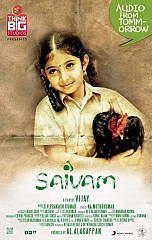PHOTOS & STILLS - GALLERY
VISITOR COLUMN

Saivam visitor review
By Ashutosh MohanBehindwoods.com isn't responsible for the views expressed by the visitor in this column. The visitor claims that this column is his/her own. If the column infringes any copyrights that you hold, please email us at columns@behindwoods.com.
If done right, a story is the best way to drive home an idea; otherwise, it might trivialize—even cheapen. Saivam, directed by AL Vijay, is a decent attempt to try and convince people over to vegetarianism, but as a film it lacks… well, meat.
Kathiresan (Nassar) is a prosperous farmer in a village. Of his three children, two are settled in Chennai and Dubai. A son, son’s wife, and their daughter Tamizh (Sara Arjun) live with him. Standard grandfather-grandaughter chemistry is worked out between Kathiresan and Tamizh who is deeply fond of a cock (Pappa) that is kept in their backyard. Kathiresan invites everyone in the family over to a temple festival. Relatives arrive from notvillage. After all the camaraderie and cute bonding, the big family decides to visit the village temple. This, according to me, has to be symbolic. A film that was until now good fun, is going to turn into a tribute to the late Rama Narayanan, maker of a multitude of divine flicks. As a last ditch attempt at divine intervention, the cast is taken to a temple to pray.
As it usually happens in temples, Tamizh’s frock catches fire. Kathiresan panics and drops a platter bearing god’s offerings, a natural reaction—but, for god this explanation is not good enough, announces a priest coming out of the sanctum sanctorum. Surely there must be a vow they had made to god that they haven’t fulfilled yet, he hazards. Once they fulfil their vow, everything should be superfine—no more fires or anything. The family remembers that three years back they had indeed vowed (Voila!) to sacrifice Pappa as thanks when they escaped an accident—and forgotten.
Everyone in the family starts looking back at the last three years like Dumbledore with a Pensieve. They aver that, of course of course!, all their problems (not able to get pregnant, not able to get a tender, not able to manage a boss et al.) must have been due to this deiva kuththam. They resolve to sacrifice Pappa ASAP. The daughter from Dubai even calls her husband over the phone and tells him that good days are coming, just wait until the sacrifice. Tamizh is naturally shocked. The rest of the movie is about whether she can save Pappa or not.
The problem with Saivam is not simply its harking back to deiva kuththam-type tropes; it is assuming that everyone will invest in unselfconscious characters trying to fulfill a vow… made to their local deity… by killing a fowl… which can act quite well. This has been a general problem with AL Vijay’s films: he gets on with the story and assumes that the audience will believe everything his characters do as if it were real life. But since, most people who go to films know that it's not real, they need characters that are well-rounded; they aren't going to believe in stuff just because you assure them that that is what really happened. For example, suddenly in a matter of two minutes, everyone in the family decides not to sacrifice Pappa simply because Tamizh asks them. Sure, she asks them in one of the cutest ways possible, but we feel cheated; we, who have invested in these characters for one and a half hours just for them to decide to casually drop the whole matter and move on.
What about that elusive tender, that impossible pregnancy, that tyrant boss? Post-climax, all problems solve themselves magically. Even the impossible pregnancy: a visit to village and non-killing of fowl solved problems which years of medical attention couldn’t. Eventually, the film’s central conflict—whether to sacrifice Pappa or not—had nothing to do with whether the characters got what they wanted; the film and it's characters moved in different directions.
AL Vijay has the distinction of being the first filmmaker to adopt mega-serial type cinematographic techniques: whenever an event occured, everyones’ facial reactions were meticulously recorded and beamed out to cinema halls with no editing whatsoever. Before end credits, he mentions: “Back when I was a kid, this story was how I became a vegetarian, according to my mother.” That makes sense. If he had actually remembered the incident firsthand, the film surely would not have the consistency of a castle he constructed using plastic playing cards... during a journey in an auto rickshaw... with a missing wheel... during a storm... with Pappa driving the auto.
Ashutosh Mohan
ashutoshmohan@gmail.com
ashutoshmohan@gmail.com
Want to publish your column too?
Please send your column to columns@behindwoods.com.
Please send your column to columns@behindwoods.com.
FACEBOOK COMMENTS
OTHER VISITOR COLUMNS
RELATED NEWS
- Suriya shows his 'Masss' ahead of Ajith and Vijay
- ''Enga Ooru Madrasu''
- Birthday revelry for Samantha ...
- Will Sivakarthikeyan reach the heights of Rajini and Vijay ?
- Will Vijay follow the happening trend?
- The three women binding Vijay and Dhanush…
- April 30th is the day for Ilayathalapathy Vijay’s Puli
- More fans vote for Ajith's Mankatha 2
- HOT - 2 more heroine additions to Vijay’s Puli
- Vishal enters the world where Rajinikanth and others already exist
- Saivam recommended to Prime Minister Narendra Modi
- Will 'Vijay 59' bring about the ‘I’ effect ?
- Rocking 'Vijay 59' gets a firebrand actress on board
- A major step for Ilayathalapathy Vijay
- Exclusive - The Rajini - Vijay influence in Vishal's title
RELATED LINKS
- Jiiva Inaugurated A Hybrid Crosffit fitness Centre at Mahalingapuram
- What connects Uttama Villain, Kaththi and Vishwaroopam?
- Idhu Enna Mayam
- Idhu Enna Mayam I II III
- Shruti Haasan
- Shruti Haasan I II III IV V VI VII VIII IX X XI XII XIII XIV XV XVI XVII XVIII XIX XX
- Shruti Haasan | "I don't know who Sachin Tendulkar is" - Slideshow
- SHRUTI HAASAN | Actresses beating the heat! - Slideshow
- Shruti Haasan | TOP 10 News - Jilla builds up strongly - Slideshow
- Shruti Haasan | DANGEROUS STALKING OF HEROINES - Slideshow
- Shruti Haasan | Ajith,Dhanush,Simbu and their big partnerships - Top 10 News - Slideshow
- Shruti Haasan | The heiresses in Kollywood - Slideshow
- Vijay I II III IV V VI VII VIII IX X XI XII XIII XIV XV XVI XVII
- Vijay | Actors who got the Madras slang right ? - Slideshow
- Vijay | Our Patriotic Heroes - Slideshow
- Vijay | Thala Bday Special: What if other stars had 'Salt and Pepper'! - Just for Fun - Slideshow
- Vijay | Rajini and Vijay Sethupathi's wheels of fortune - Slideshow
- Vijay | TOP 10 News - Jilla builds up strongly - Slideshow
- Vijay | The Aftermath of Arrambam - TOP 10 NEWS - Slideshow
- Vijay | A Week of New Beginnings - Top 10 News - Slideshow
- Vijay | 'Top Stars to dress up for Halloween' - Slideshow
- Vijay | All about issues - Top 10 News - Slideshow
- Vijay | Big releases, Big announcements - Top 10 News - Slideshow
- Vijay | Ajith, Vijay & the Superstars @ 30 - Slideshow
- Vijay | Top Ten News - Slideshow
- Vijay | Top Stars' Autographs - Slideshow
- Vijay | Top Ten News - Slideshow
- Vijay | Top Ten News - Slideshow
- Vijay | Top Ten News - Slideshow
- Vijay | Top 10 NEWS - Slideshow
- Vijay | Stars to Superstars - The Turning Points - Slideshow
- Vijay | The Patriots - Slideshow
- Vijay | Superstars Success Streak - Slideshow
- Daredevil | Tamil Superstars' Tryst with Facial Hair - Slideshow
- National Film Award for Best Lyrics - (10 Times) | A Proud Dedication to Tamil Cinema's National Award Winners - Part 1 - Slideshow
- Vijay starrer Puli's controversy solved!
- Ennama Ippadi Panreengale Ma | Ennama Ippadi Panreengale Maaaaa - Slideshow
- Mothama Senjutiya | Ennama Ippadi Panreengale Maaaaa - Slideshow
- Tamil Nadu Screen count | BLOCKBUSTER BATTLE ROYALE - Slideshow
- Censor Certification and Runtime | BLOCKBUSTER BATTLE ROYALE - Slideshow
- Preview Meter | BLOCKBUSTER BATTLE ROYALE - Slideshow
ABOUT THIS PAGE
This page has information about Saivam visitor review, Saivam, Vijay.










